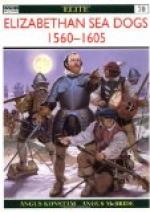But it was only the van that Fleming had sighted. Many a Spanish straggler was still hull-down astern; and Sidonia had to wait for all to close and form up properly.
Meanwhile Drake and Howard were straining every nerve to get out of Plymouth. It was not their fault, but the Queen’s-in-Council, that Sidonia had unwittingly stolen this march on them. It was their glory that they won the lost advantage back again. All afternoon and evening, all through that summer night, the sea-dog crews were warping out of harbor. Torches, flares, and cressets threw their fitful light on toiling lines of men hauling on ropes that moved the ships apparently like snails. But once in Plymouth Sound the whinnying sheaves and long yo-hoes! told that all the sail the ships could carry was being made for a life-or-death effort to win the weather gage. Thus beat the heart of naval England that momentous night in Plymouth Sound, while beacons blazed from height to height ashore, horsemen spurred off post-haste with orders and dispatches, and every able-bodied landsman stood to arms.
Next morning Drake was in the Channel, near the Eddystone, with fifty-four sail, when he sighted a dim blur to windward through the thickening mist and drizzling rain. This was the Great Armada. Rain came on and killed the wind. All sail was taken in aboard the English fleet, which lay under bare poles, invisible to the Spaniards, who still announced their presence with some show of canvas.
In actual size and numbers the Spaniards were superior at first. But as the week-long running fight progressed the English evened up with reinforcements. Spanish vessels looked bigger than their tonnage, being high built; and Spanish official reports likewise exaggerated the size because their system of measurement made their three tons equal to an English four. In armament and seamen-gunners the English were perhaps five times as strong as the Armada—and seamen-gunners won the day. The English seamen greatly outnumbered the Spanish seamen, utterly surpassed them in seamanship, and enjoyed the further advantage of having far handier vessels to work. The Spanish grand total, for all ranks and ratings was thirty thousand men; the English, only fifteen. But the Spaniards were six thousand short on arrival; and their actual seamen, many of whom were only half-trained, then numbered a bare seven thousand. The seventeen thousand soldiers only made the ships so many death-traps; for they were of no use afloat except as boarding parties—and no boarding whatever took place. The English fifteen thousand, on the other hand, were three-quarters seamen and one-quarter soldiers who were mostly trained as marines, and this total was actually present. On the whole, it is hardly an exaggeration to say that the Armada was mostly composed of armed transports while all the English vessels that counted in the fighting were real men-of-war.




